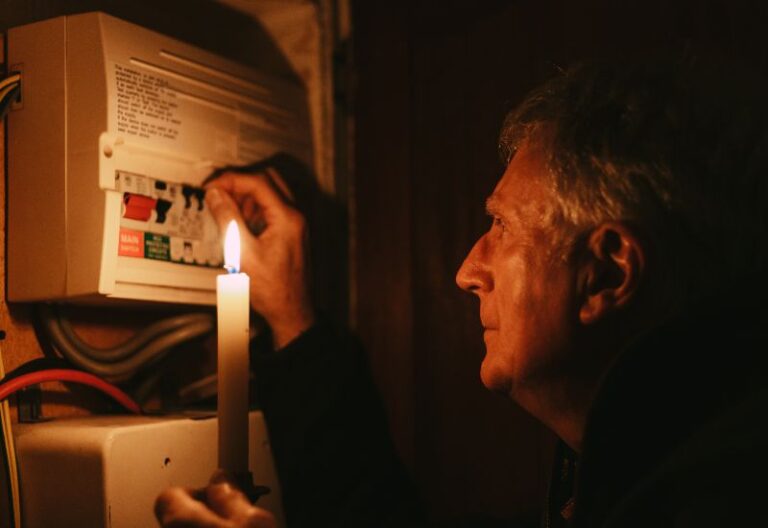
Imagine this: You’re in the middle of cooking dinner, and the latest episode of your favorite show is playing in the background when suddenly, everything goes dark. “Great,” you think sarcastically, “A power outage.” With no light and your stove gone cold, uncertainty takes over. What should you do first? Use this guide to help you navigate a power outage with confidence.
What to Do During a Power Outage
Being plunged into darkness is a huge inconvenience, but with the right approach, it doesn’t have to be a crisis. Staying calm is the first rule of the game. Once you have your emotions in check, follow these guidelines for what to do during a power outage:
- Check the circuit breaker: Before assuming the power’s out, investigate your home’s electrical circuit breaker panel. If the power appears to be only partially out, it could be a simple case of a tripped circuit, which you can easily fix by flipping the switch back.
- Confirm the outage: Are you alone in the darkness, or are your neighbors also without power? If the lights have gone out up and down the street, it’s likely a general outage. If it’s only your house, you might need professional electrical services to restore the power.
- Notify your local utility company: They may already be aware of the power outage, but your report can help workers locate and fix the problem faster.
- Unplug devices: Power surges are common when the electrical grid comes back online, which can damage electronics and appliances. To protect your devices, unplug them until power is restored.
- Keep the refrigerator closed: Avoid opening your fridge and freezer while the power’s out. The cold air trapped inside helps keep your food safe for longer.
- Stay warm or cool, depending on the season: During the winter, pile on layers of clothes to conserve body heat. In summer, drink plenty of water and retreat to the coolest part of the house.
- Use flashlights, not candles: Candles pose a fire hazard, so use battery-operated flashlights and lanterns instead.
- Preserve your phone’s battery life: Avoid using your phone for unnecessary activities to conserve the battery for emergency calls and power outage updates.
- Turn on a battery-powered radio: Storms commonly cause power outages. Listening to an NOAA Weather Radio keeps you informed of local conditions so you can take steps to keep your family safe.
- Practice generator safety: If you use a generator, set it up outside and away from windows and doors to prevent carbon monoxide poisoning. Before refueling, turn off the generator and let it cool down first.
What to Do Once Power Is Restored
The lights flicker on, and the appliances beep to life—the power is back! While it’s tempting to resume your normal activities right away, take a few steps to get everything back to normal:
- Check the circuit breaker again: Return to your electrical circuit breaker panel and verify that all circuits are receiving power.
- Gradually turn on appliances: To prevent overloading your circuits, it’s wise to power up electronics individually, giving each a few minutes to run before turning on the next one.
- Inspect your fridge: Food safety is crucial. If the power was out for longer than three hours, harmful bacteria could make many refrigerated foods unsafe to eat. This is especially true for meat, eggs, and dairy products. Throw out anything that might have spoiled during the outage.
- Check your freezer: Frozen food lasts longer without power. Typically, a full freezer will stay frozen for 48 hours. If the freezer is only half full, this drops to 24 hours. If any food has begun to thaw, cook it right away or throw it out.
- Reset your clocks and timers: Check the digital clocks and timer settings on appliances and thermostats to make sure they’re correct after the outage.
- Document the incident: If you file an insurance claim, record the date and duration of the power outage along with the specific damages your home sustained.
- Restock your emergency supplies: If you used up batteries, water, or canned food during the outage, restock them immediately.
- Consult an electrician if needed: You may have noticed some unusual electrical activity during the outage. If so, now’s the time to seek professional help.
Preparing for Future Power Outages
Don’t let the next power outage catch you by surprise—follow these tips to ensure you’re ready the next time the lights go out:
- Create an emergency kit: Your kit should contain flashlights, extra batteries, a battery-powered radio, a first-aid kit, bottled water, and non-perishable food.
- Invest in surge protectors: Point-of-use surge protectors can protect your expensive electronics from the damaging effects of power surges. However, you need whole-house surge protection to protect your appliances and HVAC system.
- Maintain your electrical system: Routine safety inspections can identify and resolve electrical system issues before they cause an unexpected power outage.
- Consider a backup generator: Installing a generator keeps your home powered during extended outages, so you can stay comfortable and avoid wasteful food spoilage.
- Create a power outage plan: Have a clear plan of action for the next time the power goes out and tell everyone in your household about it.
Contact Allen Service
Power outages are an inconvenient part of life, but with proper preparation and a level head, you can handle them like a pro. If a recent power outage damaged your electrical wiring or devices, turn to the top professional electricians at Allen Service for help.
We have over 60 years of experience providing expert electrical services in Fort Collins. Our reputation for swift response times, outstanding customer service, and unparalleled professionalism makes us the first pick for electrical repair work. The next time you experience electrical issues, whether caused by a power outage or something else, please call us at 970-672-1660 or contact us online. We have flexible scheduling options with same-day service available in many cases.
